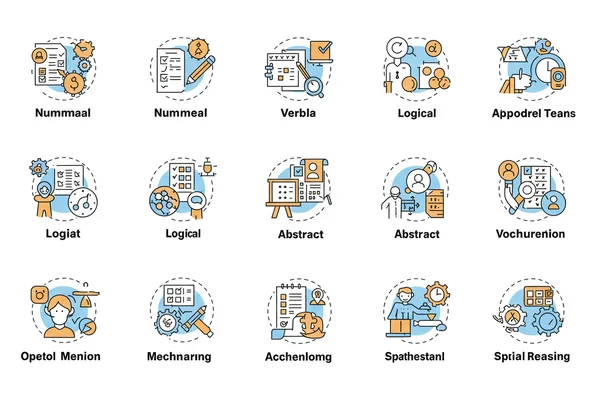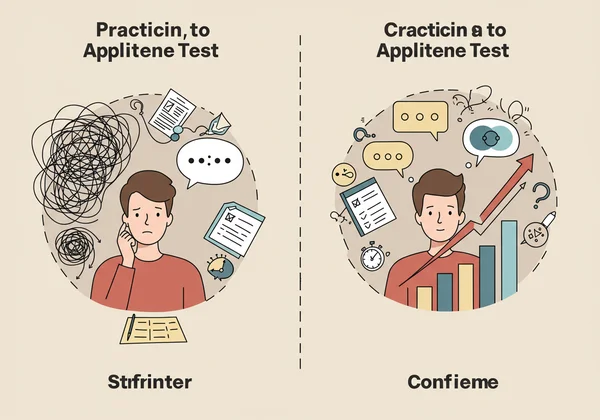How to Pass Your Aptitude Test: Ultimate Preparation Guide
July 13, 2025 | By Donovan Blackwood
Facing an aptitude test can feel daunting, whether you're a recent graduate stepping into the job market, a seasoned professional seeking a career change, or simply looking to identify your strengths. The pressure to perform well and showcase your best self is real. How can I pass my aptitude test? Imagine confidently walking into that interview, knowing you've mastered the skills needed for their aptitude test. This comprehensive guide will equip you with the essential strategies and practical tips needed to confidently approach any aptitude test, boost your scores, and maximize your capabilities. By understanding what these tests measure and employing smart preparation techniques, you'll be well on your way to success. To begin your journey, explore our free aptitude assessments.

Understanding What Your Aptitude Test Measures
Before diving into preparation, it's crucial to understand the purpose of an aptitude test. These scientifically developed assessments measure your innate abilities and potential to perform certain tasks or acquire specific skills, rather than what you already know (which is an achievement test). They provide employers with objective insights into your cognitive abilities and suitability for a role, while for individuals, they offer valuable self-discovery.
Exploring Different Types of Aptitude Tests
Aptitude tests come in various forms, each designed to evaluate a specific set of cognitive or psychomotor skills. Understanding these types of aptitude tests is the first step in tailored preparation. Common categories include:
- Numerical Reasoning Tests: Assess your ability to interpret numerical data, graphs, and tables, and perform basic calculations quickly and accurately. These are vital for roles requiring data analysis or financial literacy.
- Verbal Reasoning Tests: Evaluate your capacity to understand, interpret, and draw logical conclusions from written information. Success here indicates strong communication and comprehension skills.
- Logical Reasoning Tests: Measure your ability to identify patterns, follow logical sequences, and solve abstract problems. This often includes inductive and deductive reasoning challenges.
- Abstract Reasoning Tests: Focus on your non-verbal reasoning skills, asking you to identify patterns and relationships in shapes and figures. This indicates your capacity for strategic thinking and problem-solving.
- Situational Judgement Tests: Present hypothetical workplace scenarios and assess your judgment in choosing the most appropriate course of action.
- Mechanical Aptitude Tests: Evaluate your understanding of mechanical principles, often used for roles in engineering or trades.
- Spatial Reasoning Tests: Measure your ability to visualize and manipulate 2D and 3D shapes.
Each type targets different cognitive strengths, so knowing which tests you might face is key to effective preparation. Our platform offers a wide range of assessments to help you prepare for any challenge; simply visit our test library to see what we offer.

Is an Aptitude Test Hard? Debunking Common Myths
A common concern among test-takers is, "Is an aptitude test hard?" The truth is, the perceived difficulty often stems from unfamiliarity rather than inherent complexity. These tests are designed to be challenging but fair. They push you to think quickly and apply logical reasoning under time constraints. Many people struggle because they don't prepare effectively or don't understand the underlying principles.
One pervasive myth is that you can't study for an aptitude test because it measures innate ability. While it's true they assess potential, you absolutely can improve your performance through practice. Familiarity with question formats, understanding common pitfalls, and refining your time management skills can significantly boost your scores. Think of it like a sport: raw talent helps, but consistent training and strategy make you a champion. Our platform is built on psychometric science, offering reliable tools to help you prepare effectively.
Essential Strategies for Effective Aptitude Test Preparation
Effective aptitude test preparation goes beyond simply taking a few practice questions. It involves a strategic approach to understanding, practicing, and refining your test-taking skills. Let's explore key strategies that will make a significant difference in your performance.
Why Practice Aptitude Tests Are Your Best Friend
The single most effective strategy for aptitude test preparation is consistent practice. Why are practice aptitude tests so crucial?
- Familiarity: They introduce you to the question formats, instructions, and typical challenges.
- Time Management: Most aptitude tests are timed. Practice helps you learn to pace yourself and complete questions efficiently.
- Identify Weaknesses: Regular practice reveals areas where you need more work, allowing you to focus your study efforts.
- Build Confidence: As you see improvement, your confidence grows, reducing anxiety on the actual test day.
Engage in a variety of practice tests for different aptitude types. Make sure to simulate real test conditions, including timing yourself accurately. This hands-on experience is invaluable. You can start your practice today with a free aptitude test directly on our website.

Mastering Core Skills: Numerical, Verbal, & Logical Reasoning
While practice tests help with familiarity, genuine improvement comes from mastering the underlying skills. For numerical, verbal, & logical reasoning sections, this means dedicating time to fundamental concepts:
- Numerical Reasoning: Brush up on basic arithmetic (percentages, ratios, fractions), data interpretation, and graph analysis. Work on mental math to improve speed.
- Verbal Reasoning: Enhance your vocabulary, practice identifying logical arguments, recognizing assumptions, and drawing conclusions from passages. Read challenging articles and summarize them to improve comprehension.
- Logical Reasoning: Engage in puzzles, brain teasers, and problem-solving exercises. Focus on identifying patterns, sequences, and relationships in abstract scenarios. Online resources, puzzle books, and logic games can be immensely helpful.
Consistent effort in these areas will not only improve your test scores but also sharpen your overall cognitive abilities. For a structured approach to skill improvement, consider taking an online aptitude test to pinpoint specific areas for development.
Time Management & Smart Test-Taking Aptitude Test Tips
Beyond knowledge, how you manage your time and approach the test itself makes a huge difference. Here are critical aptitude test tips for test day:
- Read Instructions Carefully: Always take a moment to understand the instructions for each section. Misinterpreting them can cost you valuable points.
- Pace Yourself: Don't spend too long on a single question. If you're stuck, make an educated guess (if there's no penalty for wrong answers) and move on. You can always return if time permits.
- Eliminate Options: For multiple-choice questions, eliminate obviously incorrect answers first. This increases your chances of selecting the right one.
- Stay Calm: Test anxiety can severely impact performance. Practice mindfulness or deep breathing techniques. Remember, adequate preparation is your best defense against stress.
- Use Scratch Paper (if allowed): Don't hesitate to jot down notes or calculations.
These strategies, combined with thorough aptitude test practice, will position you for success. Our platform provides immediate feedback, allowing you to quickly refine your approach.
Applying Your Skills: Excelling in Job Aptitude Tests
Ultimately, for many, the goal is to excel in job aptitude tests to secure a desired position. This involves not just preparing your skills, but also preparing your mindset and environment. Understanding the broader context of pre-employment aptitude test will give you an edge.
Analyzing Your Practice Test Results for Growth
Simply taking practice tests isn't enough; the real learning happens when you deeply analyze your practice test results. Review every question, especially those you got wrong or struggled with.
- Understand Mistakes: Why was your answer incorrect? Was it a miscalculation, a misunderstanding of the question, or a time pressure issue?
- Identify Patterns: Do you consistently struggle with a specific type of question or a particular reasoning skill?
- Track Progress: Keep a log of your scores and note improvements over time. This helps you see how far you've come and what still needs attention.
This analytical step is crucial for turning practice into tangible improvement. Our AI-powered reports go beyond simple scores, offering detailed insights into your strengths and challenges, and providing actionable advice for growth. Discover your potential with our advanced AI reports.

Creating a Realistic Test-Day Environment
Your environment on test day can significantly impact your performance. When taking a job aptitude test, especially an online one, aim to replicate optimal conditions during your practice sessions:
- Quiet Space: Find a distraction-free area where you won't be interrupted.
- Stable Internet Connection: For online tests, ensure your internet is reliable.
- Proper Lighting and Ergonomics: Make sure you're comfortable and your workspace is well-lit.
- Necessary Materials: Have scratch paper, pens, and a calculator (if permitted) ready.
- Minimize Distractions: Turn off notifications on your phone and computer. Inform housemates that you need uninterrupted time.
By simulating these conditions, you build muscle memory for focus and minimize surprises on the actual day. This attention to detail can give you a significant performance boost.
Your Journey to Aptitude Test Success Starts Now
Successfully navigating an aptitude test is a skill that can be developed and honed with the right strategies and consistent effort. From understanding the diverse types of tests and debunking common myths to mastering core reasoning skills and optimizing your test-taking approach, every step in this preparation guide is designed to empower you.
Remember, practice isn't just about repetition; it's about intelligent, targeted effort. By analyzing your performance, focusing on your weaknesses, and creating an optimal test environment, you're not just preparing for a test—you're investing in your cognitive abilities and career prospects. Our platform offers the scientifically accurate tools and AI-powered insights to guide you every step of the way. Your journey to career aptitude test success and maximizing your capabilities begins now.

Ready to put your knowledge to the test? Start your free aptitude test today to gain instant results. Elevate your preparation with our detailed AI reports, designed to offer tailored feedback for growth.
Frequently Asked Questions About Aptitude Tests
How can I pass my aptitude test?
Passing your aptitude test involves a combination of understanding the test format, consistent practice, and effective time management. Focus on mastering core skills like numerical, verbal, and logical reasoning. Utilize online practice tests, analyze your results to identify weaknesses, and apply smart test-taking strategies. Our platform offers scientifically designed tests and AI-powered feedback to guide your preparation.
Can you study for an aptitude test?
Yes, absolutely! While aptitude tests measure potential, you can significantly improve your scores through dedicated study and practice. This involves familiarizing yourself with different question types, understanding the underlying concepts (e.g., mathematical principles, logical rules), improving your speed and accuracy, and practicing under timed conditions. Consistent practice using our online aptitude test tools will enhance your performance.
What happens if I fail an aptitude test?
If you fail an aptitude test, it's important not to be discouraged. It's a learning opportunity, not a definitive judgment of your abilities. Companies often use these tests as one part of a larger assessment process. Reflect on what went wrong, whether it was a specific skill area, time pressure, or anxiety. Use the experience to refine your preparation for future tests. Many companies allow re-takes after a certain period, or you might find another opportunity that doesn't require the same test. Our personalized AI reports can help you understand why do I struggle with aptitude tests? and provide a roadmap for improvement.
Why do I struggle with aptitude tests?
Many individuals struggle with aptitude tests due to a lack of familiarity with the question formats, poor time management, or underlying anxiety. It could also be that certain cognitive areas, like numerical or abstract reasoning, are weaker for you. The key is to identify the root cause of your struggle. Taking free aptitude tests and analyzing the detailed feedback (like our AI reports) can pinpoint your specific challenges and help you develop targeted strategies for improvement.